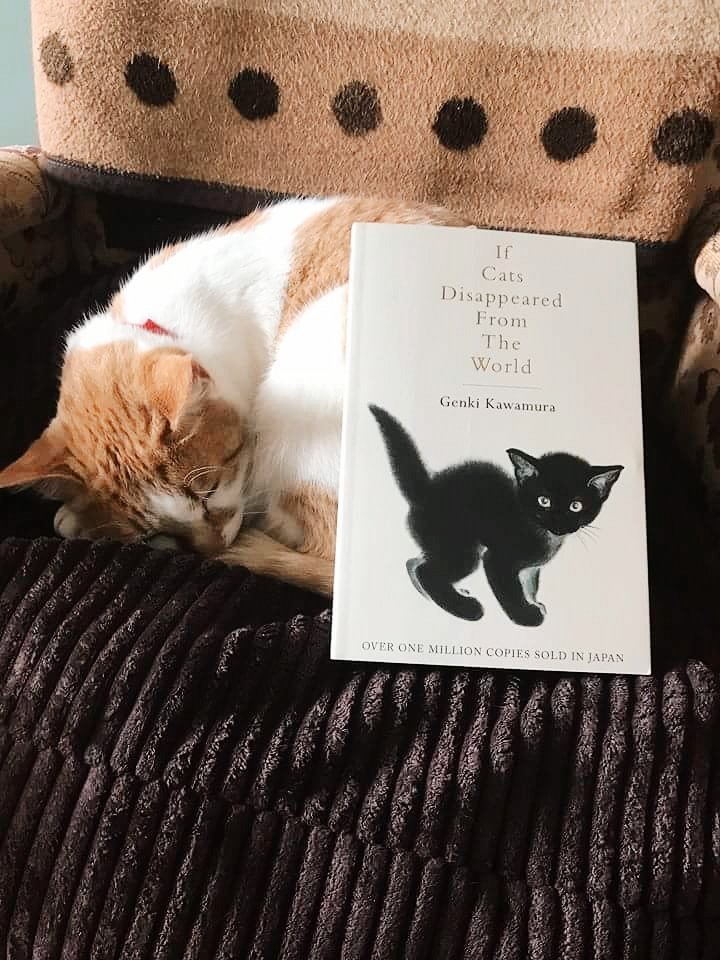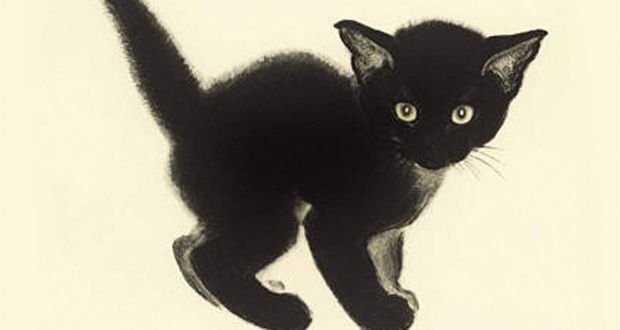If Cats Disappeared From the World Book Review
When reaching for a piece of Japanese fiction, be information technology novel, manga, or anime, there's a fifty% chance that you'll find a cat on the cover, a cat in the title, a feline protagonist, or a story chock full of true cat-related shenanigans. While in the west nosotros proudly label the domestic dog as man's best friend, in Nippon it is undeniably the cat. And so, with his debut novel (originally released in Japanese dorsum in 2012), Genki Kawamura muses over life and its priorities in If Cats Disappeared from the World.

The Story
Our narrator – a motion-picture show-loving, true cat-owning, thirty-yr-one-time everyman – is, in the book's opening chapter, informed that he will soon be killed by a stage 4 encephalon tumour he had no idea was hiding in there.
Upon returning home to his cat Cabbage, he is greeted by a happy Hawaiian-shirted version of himself claiming to be the devil. This devil offers our narrator an extra day of life for each thing in the earth he is willing to sacrifice.
Believing at get-go he could simply choose to vanish a stain here or a rock there, he gladly accepts the devil's demands, just to and then be shocked when the actual honest-to-god capital D Devil proves to be -spoilers- deceptive. The devil is the one to make the demands; our narrator so accepts and lives with the consequences, or doesn't.
"When I establish out, the first thing that occurred to me was that I was but ane postage stamp away from getting a gratis massage on my loyalty card."
We know from the title that cats will be 1 of the devil's demands, and we can also presume that it won't be the first, or 2d, but eventually, information technology'll come.
The Philosophy
Much of this somewhat opposite-Faustian novel seems predictable from the first. We can see clear as day the choices our mailman will be forced to make, the upstanding struggles he must consider, and of course what is ultimately the neon-lit theme of the story: what, in life, is truly important?
This philosophy comes at a perfect time in our cultural zeitgeist. Minimalism is currently a global trend, commercialism is in its late stages and coming under fire from millennials, and young people are favouring travel and liberty over being a homeowner. And and so what amend time to question what we actually need cluttering up our lives?
Information technology is this that ultimately saves the novel from becoming trite and predictable. We have seen this story of existential dread in similar forms before, from classic films such as It's a Wonderful Life to fifty-fifty more archetype literature similar Dickens' A Christmas Ballad.
The concept here is anything but new, but information technology comes at a fourth dimension in our cultural story where the question is at everyone'southward lips, and so as we read it nosotros feel the very real weight of the protagonist'southward choices and decisions.
"Cats and humans take been partners for over ten thousand years. And what you realise when you've lived with a true cat for a long time is that we may retrieve we ain them, just that's non the way information technology is. They but allow us the pleasance of their company."
Where information technology Succeeds
If Cats Disappeared from the World is a short book, devourable in an afternoon, and while this does stifle information technology, giving information technology little room to slow downward and exhale and contemplate the weight of it all, it does add to the stress and anxiety that the protagonist feels.
He has no time to think; each option grants him an actress day, and most of that day is spent because his next choice and whether it is worth one more than day. A day spent making difficult decisions. The dread is palpable and makes for a frustrating (in a good way) read.
The book's greatest strength comes in the form of the few pockets of breathing room we are afforded. Each new twenty-four hours is a new choice for our protagonist, and hither another connection to his past is unveiled.
Through flashbacks and sometime connections rekindled we see a past relationship breaking down, the decease of his female parent several years prior, and the ever-stretching dried rift that exists between him and his male parent. In these moments of fantabulous human failure and loss we encounter real depth of graphic symbol, and and so we, forth with the protagonist, feel the most alive within the story.

Where it Fails
These excellent pockets of life are contrasted by some shaky dialogue back in the nowadays, yet. Early in the book when the devil is introduced, nosotros are forced to argue with Kawamura'south baffling selection to make him awkwardly funny, aloof, off-kilter, and whacky. He comes off equally The Joker equally written by Tommy Wiseau.
The choice of his attire and personality was clearly that of Kawamura, only translator Eric Selland did his best to exist faithful to this iteration of the devil past translating some of the nigh teeth-clenchingly awkward dialogue I've ever had to read through. To remember that Selland was responsible for the astounding, deft-of-manus, and beautifully poetic translation of Takashi Hiraide'southward The Guest Cat (yeah, more cats) left me stunned.
Comparing the two leaves me to presume that Selland possibly did his best to salvage some truly wonky dialogue from Kawamura.
"I'm saying, information technology was simply a cold and I had to drag you all the way back here. That's difficult piece of work, dude, even for a devil!"
On summit of this we receive an ex-girlfriend who comes off as unlikeable, and not because she is an ex whose profile is skewed past the protagonist'due south narration, only rather because she is entirely indifferent to his imminent expiry.
Her interest in his wellbeing is not-real on a basic human level, regardless of their own personal history. As she speaks I cannot help but envision a brick wall with an open up-mouthed, blank-eyed stare crudely drawn on in permanent marking.
Afterward every conversation, revelation, and argument, she but displays no emotion and so fades into the mist. Towards the end, I began to wonder if this girlfriend was non human at all, simply was, in fact, a cardboard cut-out which the protagonist feigned arguments with in lodge to ignore his axiomatic loneliness.
"Practice you feel distressing?" she said, as we left the theatre.
"I don't know."
"I guess it must be rough on you."
"I don't know. Distressing, I really don't know how I experience right now."
Too, the ramifications for what our narrator chooses to disappear from our world are defective. For example, the second thing the devil chooses to disappear is 'films'. All of them. And and then, our protagonist is given time to watch one last movie of his choosing earlier all are disappeared.
He enlists the help of an old friend who has worked at a video rental store for 10+ years, then chooses a film, and subsequently, they are all vanished. But what near this friend'south job? What virtually the cinema industry? Nosotros encounter no anarchy, no paper headlines, nix. Films vanish, he misses them a scrap, and we're on to the next thing.
Of course, this lack of broader attention may be indicative of our protagonist's selfishness, which nosotros tin can half-way forgive due to his cancer and recently-developed relationship with Satan.
Yet, it does only serve to deepen our dislike of the cast of this story. And non in the aforementioned way that we dearest to hate the cast of Wuthering Heights. These are non deeply flawed, brutal, nasty gothic figures. They can exist mundane, and their behaviours left me both unmoved and somehow saddened by the closing of this book.
Conclusion
What we have in its entirety hither is a novel of grand themes, executed with greater and greater success as the story progresses. Its flashbacks are endearing and elegant, while its character dialogue is stunted at best and cringe-worthy at worst.
The philosophy played with here is nothing new, only information technology is sincere and thoughtfully executed. Its faults are plentiful, but it is by no means a bad volume. To present and discuss such complex ideas with any degree of dynamism and fun makes it a success,, in my opinion, if a slightly two-dimensional 1.
If you lot liked this review and so yous might like our review of – The Travelling Cat Chronicles.
If you're considering writing your own stories and becoming an author, take this writing class from author Yiyun Li and a 30-twenty-four hour period costless trial from Skillshare.
Source: https://booksandbao.com/review-cats-disappeared-from-world/
0 Response to "If Cats Disappeared From the World Book Review"
Post a Comment